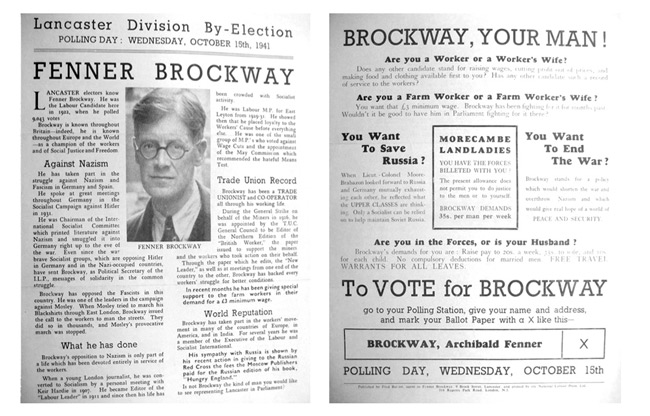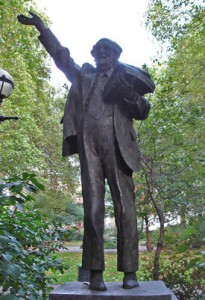
Fenner Brockway is a significant figure in British twentieth century politics. An ardent socialist and pacifist, his long political career had important connections with Lancaster: he stood twice, unsuccessfully, for election to the local parliamentary seat in 1922 and 1941. Below David Greenall charts Brockway’s lifetime of political engagement ‘inside the left’ and thereby provides a useful context for analysing Fenner’s early activism, stimulated in part by the outbreak of the First World War.
Nick Beddoe’s article focuses on this early period in Brockway’s career, including his co-founding of the No Conscription Fellowship (NCF) in 1915, an organisation which campaigned against conscription and provided support for those who fell foul of the law for refusing military service. Brockway himself was imprisoned for his NCF activities and, as Nick suggests, his well-known pacifist stance may have contributed to some hostile publicity during his first parliamentary campaign in Lancaster a few years after the war. >> READ MORE
- Born 1888 in Calcutta; he would later campaign for Indian independence.
- Educated at the School of the Sons of Missionaries in Blackheath, London.
- Worked at the offices of Quiver magazine after leaving school and supported the Liberals during the 1906 general election.
- In 1907 went to interview Kier Hardie and was so impressed that he became a socialist from that point on.
- Joined the Social Democratic Foundation but later transferred allegiance to the Independent Labour Party (ILP). Also attended Fabian Society Meetings.
- Fenner and the ILP opposed the move to war in 1914 and subsequently conscription.
- The ILP opposition meant loss of popularity but brought added cohesion and dedication. Circulation of its newspaper, The Labour Leader, rose to 20,000.
In 1916 Fenner was prosecuted for distributing a leaflet opposing conscription and refused to pay a fine. He was jailed at Pentonville, then at the Tower of London (reserved for traitors). He was later transferred to Chester Castle, then Walton Prison in Liverpool.
- Fenner’s offices were raided in 1915 and he was prosecuted on grounds of publishing seditious material. Brockway won this case in court.
- In 1915 Fenner formed the No Conscription Fellowship (NCF), along with Clifford Allen. The NCF provided practical assistance to those who refused military service.
- In 1916 Fenner was prosecuted for distributing a leaflet opposing conscription and refused to pay a fine. He was jailed at Pentonville, then at the Tower of London (reserved for traitors). He was later transferred to Chester Castle, then Walton Prison in Liverpool.
- Fenner stood as the Labour candidate in the 1922 Lancaster parliamentary by-election; he was unsuccessful.
- During the 1920s he worked for prison reform and also campaigned for Indian independence from the British Empire.
- Edited (1926) TUC newspaper The British Worker during the General Strike.
Fenner stood as the Labour candidate in the 1922 Lancaster parliamentary by-election; he was unsuccessful.
- In the 1929 General Election Fenner was the successful Labour Party Candidate for East Leyton in London. He opposed formation of the National Government and lost his seat in the 1931 General election. The ILP disaffiliated from the Labour Party shortly after this.
- Questioned his pacifism during the Spanish Civil War and supported the Republican forces.
- Supported Britain’s involvement in World War 2 to oppose fascism – he saw Nazism as extreme capitalism. Fenner still believed in the individual’s right to object, however, and chaired the Central Board for Conscientious Objectors.
- Fenner stood as ILP candidate for the Lancaster by-election in 1941; he was again unsuccessful but provoked debate.
Fenner stood as ILP candidate for the Lancaster by-election in 1941; he was again unsuccessful but provoked debate.
- Re-joined Labour Party after World War 2 and won a seat at Eton and Slough in the 1950 General Election.
- Lost his seat in the 1964 general election. His left wing views upset some of his constituents.
- Throughout the 1960s and 1970s Fenner campaigned for peace and chaired the Movement for Colonial Freedom and the World Disarmament Campaign (1979 – 1988).
- Accepted a life peerage in the 1960s, despite his left wing views.
- Brockway died in 1988, six months before his 100th birthday.
- Wrote over twenty books on politics, including Inside the Left and 98 Not Out.
Throughout the 1960s and 1970s Fenner campaigned for peace and chaired the Movement for Colonial Freedom and the World Disarmament Campaign (1979 – 1988).
REFERENCES & FURTHER READING
- Brockway, F., 2010. Inside the Left: Thirty Years of Platform, Press, Prison and Parliament. 2nd edition. Nottingham: Spokesman Books.
- Purnell’s History of the First World War (weekly publication, late 1960s, now out of print)
- The Spartacus Educational Website is also a good resource online for this subject area: [insert hyperlink: www.spartacus-educational.com]
- Featured image (Top) courtesy of Salford’s Working Class Movement Library, which has a wide selection of original documents on Brockway and the No Conscription Fellowship. Arrangements to view these documents for research purposes can be made in advance.


